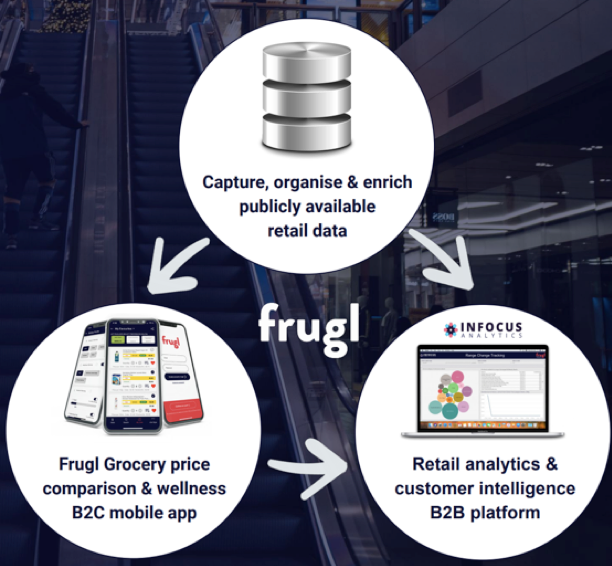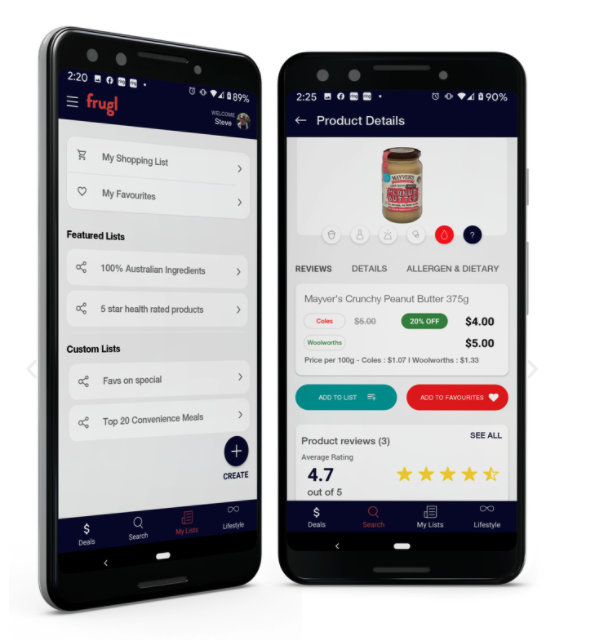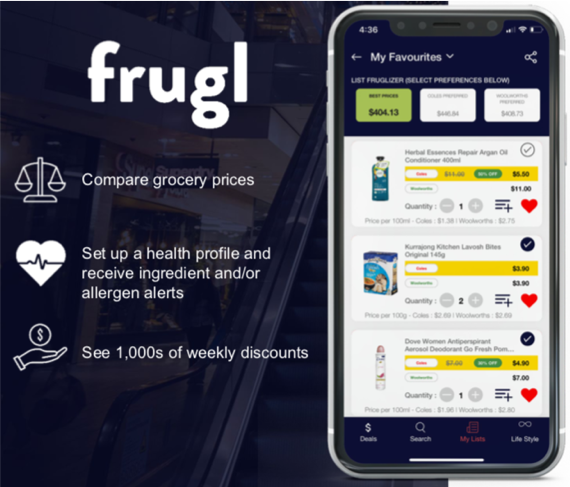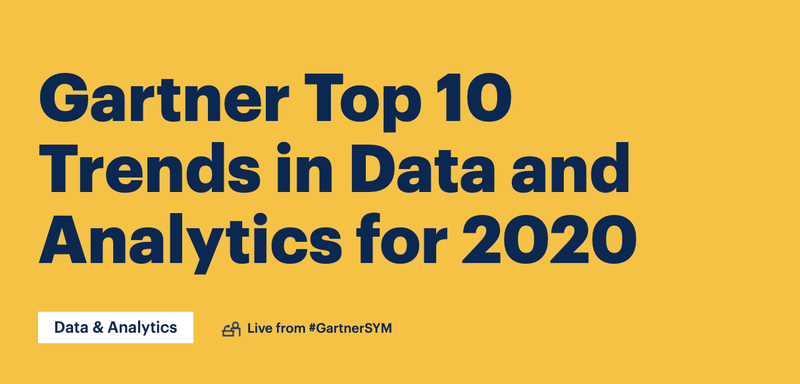FGL - The Micro Cap ASX Tech Stock on the Cusp of Commercialisation
Here at Catalyst Hunter, we invest in tiny ASX stocks that have the potential for rapid, near term share price movement.
Frugl Group Ltd (ASX: FGL) is our latest investment that fits this criterion.
FGL is a tiny tech stock capped at $9M, and despite its ‘shell-like’ valuation, it is a serious tech company with a real product.
We see significant upside from FGL’s current levels and are looking to get a return of multiples on our current investment.
After reviewing FGL’s recent Investor Presentation and conducting our own due diligence and calls with management, we think there is a chance the company could convert its recent product development traction into real revenue and momentum in 2021.
FGL provides highly detailed retail data analytics to large businesses that are desperate to see the promotional tactics their competitors are employing, and what consumers are buying in any given week as a result.
From what we can see in FGL’s investor presentation, the company expects that commercial contracts for ongoing data services will begin in the first half of 2021, with the second half expected to see the expansion of commercial data and intelligence services that will include shopper behavioural data.
Commercial contracts are exactly what FGL needs, now that it looks like the product is ready and in use.
The retail data analytics market is a vast global market and FGL has a unique data offering to businesses.
There are a host of companies spanning many sectors prepared to pay large sums for retail pricing, promotional and consumer data - think anywhere from product wholesalers trying to price their latest products, to financial services companies trying to understand the economy.
Just look at Nielsen (NYSE: NLSN), an $8 billion NYSE behemoth in the space. Nielsen delivers crucial market research data to major clients like The Coca-Cola Company, Nestlé S.A., The Procter & Gamble Company, Unilever Group.
It’s early days for FGL, but we would argue that FGL has technology and a data offering that not even Nielsen can provide - we will go into more detail further along.
The FGL management team has been drawn from major Australian and international retail companies, including Woolworths, and are all highly experienced in the space.
Given its current $9M valuation, we think FGL has been seriously overlooked by the market.
If the company can start getting some traction on the commercialisation front in the coming months, we think it could be trading at many multiples from today’s price.
It is worth noting here that the company had $1M in the bank at the end of last quarter, so despite a relatively low cash burn at the moment, it may need to raise capital in the coming months - which is not unlike most small cap, pre revenue small cap ASX stocks.
However at the same time, FGL is currently a tightly held stock, with very few shares on issue - so it could move rapidly on the right newsflow, even before the company considers raising new funds.
What does FGL actually do?
FGL has developed technologies that incorporate real-time data capture, cloud-based storage and advanced cloud-based data analytics.
It offers what it calls a “retail intelligence ecosystem” that acquires publicly available grocery data, organises it, enriches it, and utilises it to power two independent retail platforms:
- Frugl Groceries - a free grocery comparison and wellness mobile app for shoppers (B2C), and;
- InFocus Analytics - an advanced retail analytics platform for retailers, suppliers and analysts (B2B).

How can FGL make money?
The company effectively has a flywheel revenue model where:
- Users of the free Frugl Grocery price comparison app provide valuable behavioural data for the company’s B2B data analytics platform.
- FGL can sell that data to a host of businesses. Those sales mean the company can spend more money marketing the price comparison app to consumers and getting all important downloads.
- The more consumers using the price comparison app, the more valuable the data, and the more revenue FGL can generate.
And so the flywheel grows.
Let's dig a bit deeper into each part of the business model and see just how FGL can grow its business and monetise its data.
Frugl Groceries - the free consumer app
A key part of the FGL business model is to provide value for consumers so that it can get more app downloads and engagement.
It's doing exactly that via the Frugl Groceries app - a free grocery comparison and wellness mobile app for shoppers (B2C).
The app is available right now on app stores:

The app compares over 40,000 different products from major supermarket chains.
It allows shoppers to compare grocery prices, set up a health profile and receive ingredient and/or allergen alerts and see 1,000s of weekly discounts.
Saving money on the grocery bill
The app aggregates grocery data in real time to provide shoppers with up-to-date specials, product and pricing information to find the lowest grocery prices across Australia’s leading supermarkets: Coles and Woolworths.
These two major brands have an online shopping capability which enables Frugl to capture the data.
However, the company is now looking at emerging second tiers such as Drakes, Harris Farm and Amazon Grocery.
Keeping consumers healthy
The wellness component of the app overlays wellness tools for shoppers to enable them to compare products and optimise shopping lists by nutritional value, ingredient listings, allergen inclusions, health and product sustainability ratings.

There has been strong uptake since the app launched last year, helped by a Channel 9 report in September last year.
One major catalyst for the company will be the release of Version 3.0 of the app in the March quarter, which will be the first version of the app that the company properly markets.
Note, that without any marketing so far, the company has already had over 24,000 user accounts created on the app.
So while the consumers are getting valuable information about what's going in their shopping basket, in the background, users of the Frugl Grocery app generate user behaviour and segment data that is collated and used for the company’s B2B platform.
Enter InFocus Analytics - FGL’s advanced retail analytics platform for retailers, suppliers and analysts (B2B) which provides product and pricing analytics, promotional analytics and competitor range analytics.
And this is where FGL’s revenue model starts to get really interesting.
Arming B2B clients with valuable data intelligence
InFocus Analytics (IA) arms FGL’s clients with competitor pricing and product range intelligence, historical pricing and promotional trends to help shape promotional strategy.
Through its data capture, FGL aims to create close, collaborative working relationships with its clients and build innovative and intelligent data solutions that unlock real business value.
Here is an example:
FGL is selling this Analytics platform via a SaaS model, alongside custom solution development.
The platform helps businesses understand their customers and their competitive environments by developing data driven solutions matching their needs, and applying analytical techniques to create relevant and actionable insights.
FGL utilises data acquisition capabilities with full product, pricing, promotional, nutritional and catalogue data from supermarket competitors being collated on an ongoing basis.
By using this data, businesses can better understand their customers and their competitive environments by developing data driven solutions to suit their needs, and by applying analytical techniques to create relevant and actionable insights.
This kind of data, provided in almost real time, is something we think is unique in the marketplace.
It's going to put FGL in a very strong position to monetise its data in the near term.
Where many of the bigger market research companies are using the old way of secret shoppers going into stores to gather pricing and promotional information, FGL is doing it all via its technology.
Commercialisation Ahead for FGL
As we touched on earlier, looking at FGL’s investor presentation, the company expects that commercial contracts for ongoing data services will begin in the first half of 2021, with the second half expected to see the expansion of commercial data and intelligence services that will include shopper behavioural data.
Commercial contracts for the InFocus Analytics SaaS product are due to commence very soon, followed by the inclusion of customer behaviour data into InFocus analytics for new and existing customers.
These commercial contracts come at a time when Gartner estimates that the data analytics market in Australia is valued at $1 billion, and IAB Australia estimates the digital advertising spend in Australia is nearly $9 billion.
Data was one of the hot trending topics of 2020 and will continue to be so as we move forward.

Part of the group’s revenue model incorporates the e-commerce sector, and statistica.com estimates that the food and personal care segments of this market are valued at more than $8 billion.
Hence, this is a big, identifiable market that FGL has the tools to tap into.
The management team knows a thing or two about data
Driving Frugl forward is a management team well versed in the power of analytics.
Leading the charge is CEO Sean Smith, who has close to 20 years’ experience with ASX-listed Australian companies, NYSE-listed global businesses and one of Australia’s privately funded start-up success stories.
Smith has worked in the management side of omni-channel retail, customer experience, data strategy and commercialisation, marketing technology and marketing strategy.
He was Head of Customer Experience for Woolworth’s Endeavour Drinks Group, where he led a customer experience and analytics teams focused on increasing customer retention, value and sustained profitability.
Smith was also Head of Marketing for online restaurant booking app, Dimmi, where he successfully launched the consumer proposition focusing on customer acquisition, retention and value growth.
Further achievements came as lead global data strategy for HotelClub, owned by multinational travel business Orbitz Worldwide, where his focus included customer lifecycle strategy, customer experience and data commercialisation.
Suffice to say he knows a thing or two about data management and growth and can speak the language, which will be a major benefit when FGL begins to bring clients on board.
Also in the mix is John Wild, who has worked among a diverse range of categories and companies including Unilever, British Telecom (where he launched the O2 brand in Europe), Telstra, Orbitz Worldwide and more recently at Groupon (NASDAQ: GRPN) in roles including CMO (APAC) and VP of Marketing (North America).
Wild will also be integral in bringing clients on board and is already in discussions with several potential clients.
Finally, Alistair McCall has vast expertise in creating and implementing organisational data strategies to realise full commercial value from data assets.
As Data Strategy Director at MercerBell Customer Experience Agency, Alistair consulted with clients across a broad range of industries including Retail and FMCG, to lead the development of data strategy, aligned to business issues and objectives. He led the Analytics & Insights function at Woolworths Liquor Group, developing their analytical capabilities, and providing strategies to grow and commercialise the customer data of multiple businesses across the organisation.
If there is an A-team in retail data analytics among ASX listed juniors, this is it.
We look forward to how this team works together to delight consumers, onboard B2B clients and work towards growing value for shareholders.
General Information Only
This material has been prepared by StocksDigital. StocksDigital is an authorised representative (CAR 000433913) of 62 Consulting Pty Limited (ABN 88 664 809 303) (AFSL 548573).
This material is general advice only and is not an offer for the purchase or sale of any financial product or service. The material is not intended to provide you with personal financial or tax advice and does not take into account your personal objectives, financial situation or needs. Although we believe that the material is correct, no warranty of accuracy, reliability or completeness is given, except for liability under statute which cannot be excluded. Please note that past performance may not be indicative of future performance and that no guarantee of performance, the return of capital or a particular rate of return is given by 62C, StocksDigital, any of their related body corporates or any other person. To the maximum extent possible, 62C, StocksDigital, their related body corporates or any other person do not accept any liability for any statement in this material.
Conflicts of Interest Notice
S3 and its associated entities may hold investments in companies featured in its articles, including through being paid in the securities of the companies we provide commentary on. We disclose the securities held in relation to a particular company that we provide commentary on. Refer to our Disclosure Policy for information on our self-imposed trading blackouts, hold conditions and de-risking (sell conditions) which seek to mitigate against any potential conflicts of interest.
Publication Notice and Disclaimer
The information contained in this article is current as at the publication date. At the time of publishing, the information contained in this article is based on sources which are available in the public domain that we consider to be reliable, and our own analysis of those sources. The views of the author may not reflect the views of the AFSL holder. Any decision by you to purchase securities in the companies featured in this article should be done so after you have sought your own independent professional advice regarding this information and made your own inquiries as to the validity of any information in this article.
Any forward-looking statements contained in this article are not guarantees or predictions of future performance, and involve known and unknown risks, uncertainties and other factors, many of which are beyond our control, and which may cause actual results or performance of companies featured to differ materially from those expressed in the statements contained in this article. S3 cannot and does not give any assurance that the results or performance expressed or implied by any forward-looking statements contained in this article will actually occur and readers are cautioned not to put undue reliance on forward-looking statements.
This article may include references to our past investing performance. Past performance is not a reliable indicator of our future investing performance.

